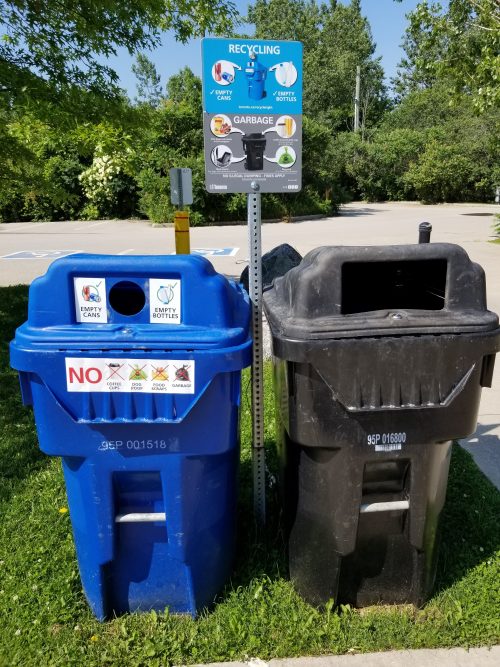
Starting on July 3, 2024, Toronto residents and visitors can place single-use hot (e.g. coffee and tea) and cold (e.g. fountain drinks) paper-based beverage cups in recycling bins found in Toronto parks and in the recycling compartment of street litter bins.
It’s just as important to recycle right in Toronto parks and public spaces as it is at home and at work. Street bins (with openings for both garbage and recycling) and park bins for recycling and garbage, as well as Green Bins for organic waste in some parks, are available to help you put waste in the right place on the go.
Incorrect placement of items such as dog waste, food waste and black plastics in recycling compartments of public litter bins is ruining perfectly good recyclable material, sending it to landfill.
To help reduce the amount of dog poop and organics ending up in the garbage or recycling, the City of Toronto has installed Green Bins in all Dog Off-Leash Areas in parks.
The City of Toronto also installed new lids on recycling bins in parks and sports fields across the city as a pilot project to capture empty beverage cans and bottles.
These waste items are often incorrectly placed in public recycling bins/slots:
Dog waste should never be placed in the Blue Bin or in the recycling compartment of street bins. Place dog poop (in any bag) in a park Green Bin, if available. If a park Green Bin isn’t available, place dog poop in the garbage bin or take it home and place it in your Green Bin (organic waste).
Food scraps should never go in the recycling slot of public litter bins and park Blue Bins (recycling). Food residue gets soaked up by paper and can ruin large batches of otherwise good recyclables. Food waste should never be placed in the Blue Bin. It should be placed in the Green Bin (organics) or garbage (litter slot) if no Green Bin is available.
Black plastic of any kind, such as take-out containers and black garbage bags, aren’t accepted in the City’s recycling program. It should never be put in the recycling compartment of public litter bins and park Blue Bins. Reuse items such as takeout containers. Otherwise put them in the garbage.
While the City works to divert as much waste as possible from landfill, the material in public recycling bins is often heavily contaminated with non-recyclable items, such as containers with food and liquid in them, black plastic and pet waste. When this happens, much of the recycling is ruined, sending it to landfill.
In spring 2021, the City of Toronto installed new lids on 300 recycling bins in parks across the city. The new bin lids have a hole designed to exclusively capture empty beverage cans and bottles. Stickers adhered to the bins and signage beside the bins indicate what items are accepted and not accepted in the recycling bins.
Data collected from the beverage bin pilot determined that dedicated bins for bottles and cans can contribute to a long-term strategy to reduce contamination and increase the amount of recycling collected from park bins. The volume of recyclable materials found in beverage bins was highest at sports fields.
In spring 2023, the City installed beverage bins at premium sports fields across Toronto. The goal of installing bins at sports fields is to increase the amount of material the City can recycle from areas that generate the most beverage cans and bottles.
